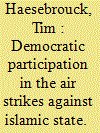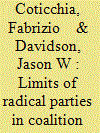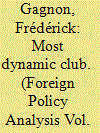|
|
|
Sort Order |
|
|
|
Items / Page
|
|
|
|
|
|
|
| Srl | Item |
| 1 |
ID:
159580


|
|
|
|
|
| Summary/Abstract |
This study revisits Carter and Scott’s model of congressional foreign policy entrepreneurship (2004, 2009, 2010) to evaluate how a new generation of legislative innovators, including Senators Rand Paul and Ted Cruz, may influence US foreign policy. Specifically, this study proposes two new types of foreign policy entrepreneurs in Congress—“revolutionaries” and “mercenaries”—and examines their different motivations, policy objectives, and strategies to attempt to influence or change state behavior. Case evidence suggests that in a new era of partisanship and polarization, more complex models of players, strategies, and measures of success are needed.
|
|
|
|
|
|
|
|
|
|
|
|
|
|
|
|
| 2 |
ID:
159578


|
|
|
|
|
| Summary/Abstract |
Why do minor powers ever resist the demands of major powers? Although recent work has begun to provide answers to this question, we argue that research has missed a vital piece of bargaining dynamics in dyadic research: third-party influence. Using spatial modeling techniques with the Militarized Interstate Dispute and International Crisis Behavior datasets, we improve upon previous models of asymmetric conflict by showing that the presence of a neighboring rival of a minor power, and the relationship that rival has with a major power, conditions the likelihood that weak actors choose to fight the strong. The recent examples of Pakistan and Iraq, after the 9/11 terrorist attacks in the United States, serve as ideal types in which minor powers are respectively less and more likely to resist the demands of major powers. We find quantitative support that regional rivalries can act as both constrainers and enablers for minor powers when bargaining with major powers.
|
|
|
|
|
|
|
|
|
|
|
|
|
|
|
|
| 3 |
ID:
159582


|
|
|
|
|
| Summary/Abstract |
Although over sixty partners have joined the US-led coalition against the Islamic State (IS), only a handful of states was willing to carry out air strikes against IS-targets. This article aims to explain the pattern of democratic participation in the air campaign. It builds on the rich literature on military burden sharing and democratic peace theory to develop a multi-causal model, which is tested with Qualitative Comparative Analysis. The results of the analysis suggest that the pattern of participation in the air strikes results from a complex interplay between alliance politics, threat perception and domestic institutional constraints. The threat posed by foreign fighters and a strong interest in a good relationship with the US constituted important incentives to participate in the air strikes, while a high level of parliamentary involvement in military deployment decisions inhibited participation. Furthermore, states that were situated in Russia's immediate vicinity refrained from participating, in spite of their strong dependence on the US' security guarantee. Lastly, the analysis did not provide convincing evidence that partisan politics had an impact on participation in the air strikes.
|
|
|
|
|
|
|
|
|
|
|
|
|
|
|
|
| 4 |
ID:
159583


|
|
|
|
|
| Summary/Abstract |
As democracy develops in poor countries around the world, wealthier countries have sought to enhance social development and democratization through foreign aid. Although the national state has historically been the recipient of aid, some donors have begun to consider donations to local governments. If local government is democratic, it may deliver aid more immediately than does national government. The question relates to concerns in comparative politics about which level of government best enhances democratization, the national or the local level. This article speaks to International Relations and comparative politics by suggesting that, under sequencing conditions that grant political autonomy first, local government can be democratic and can be an effective recipient for aid. The article explores the Nicaraguan case where these conditions prevailed to show how this scenario can unfold. In Nicaragua, donors have had a powerful effect on improving people’s lives and on advancing democratization. As the democratic quality of the national government has declined, foreign aid has continued to advance democratization by providing mayors with a resource base independent of national government.
|
|
|
|
|
|
|
|
|
|
|
|
|
|
|
|
| 5 |
ID:
159577


|
|
|
|
|
| Summary/Abstract |
Scholars increasingly suggest that coalition governments produce more extreme foreign policies than single-party governments. Extremity is especially likely when governments include radical parties that take extreme positions on foreign policy issues and are “critical” to the government’s survival, as the radical parties push the centrist ones toward the extremes. A look at Italy’s Second Republic provides an important counterpoint to the extremity hypothesis. In three high-profile cases of military operations—Albania 1997, Kosovo 1999, and Afghanistan 2006–08—Italy had a center-left government that depended on radical parties for its survival. In all cases, the radical parties opposed military operations but did not prevent the government from acting by forcing the government’s fall. Our article seeks to explain the limits of leftist radical parties in Italy’s Second Republic. We argue first that radical parties are reluctant to threaten or force government collapse as this can lead to an opposition coalition coming to office and voters’ being blamed for the outcome. Second, we claim that foreign policy has been less important to radical parties than domestic issues. Finally, we argue that radical parties have appealed to their voters through theatrical politics and have affected the implementation of military operations.
|
|
|
|
|
|
|
|
|
|
|
|
|
|
|
|
| 6 |
ID:
159579


|
|
|
|
|
| Summary/Abstract |
Relying on a multilevel approach to the behavior of members of Congress, this article explains why Arthur Vandenberg, J. William Fulbright, and Jesse Helms were particularly active chairs of the Senate Foreign Relations Committee. It draws parallels between their careers and shows that similar factors explain why they were active: (a) crucial international events convinced them to play a leading role in the foreign policy debate; (b) the US political and social environments created policy windows for their activism; and (c) they possessed the necessary skills, interests, and convictions to play such a role. Our approach also explains why the three chairs displayed different types of activism (Vandenberg relied on legislative and nonlegislative collaboration with Harry Truman, Fulbright primarily on nonlegislative opposition to Lyndon Johnson, and Helms on legislative and nonlegislative opposition to Bill Clinton). Furthermore, this article explains why Fulbright was less successful than Vandenberg and Helms in convincing Congress and the President to adopt key legislations he introduced in the Senate.
|
|
|
|
|
|
|
|
|
|
|
|
|
|
|
|
| 7 |
ID:
159581


|
|
|
|
|
| Summary/Abstract |
Why do states that make a deliberate effort to pursue rapprochement sometimes fail? This article dissects US–North Korea relations between 1994 and 2002 as one way to better understand how deliberate decisions to dramatically improve relations with a historical adversary go awry. This vastly understudied period in US–North Korea relations started in late 1994 with an ambitious agreement to move toward diplomatic normalization through a gradual process based on reciprocal “action for action,” abruptly ending in 2002 with mutual acrimony and the resumption of long-standing hostility. Why did reciprocity strategies by both sides in the intervening period fail to deliver the promised relational change?
|
|
|
|
|
|
|
|
|
|
|
|
|
|
|
|
|
|
|
|
|